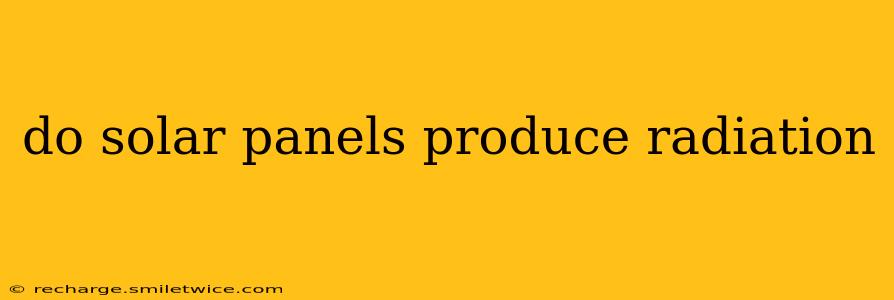Do Solar Panels Produce Radiation? Understanding the Facts
The question of whether solar panels produce radiation is a common one, fueled by understandable concerns about the potential health impacts of technology. The short answer is: solar panels do not produce ionizing radiation, the type that can damage DNA and cause health problems. However, they do produce a very low level of another type of radiation, and understanding the difference is key to dispelling any anxieties.
Let's break down the types of radiation and address the common concerns:
What Kind of Radiation Do Solar Panels Produce?
Solar panels primarily utilize the photovoltaic effect to convert sunlight into electricity. This process doesn't involve the production of ionizing radiation like X-rays or gamma rays. Instead, solar panels produce non-ionizing radiation in the form of infrared (IR) radiation and ultraviolet (UV) radiation.
-
Infrared (IR) radiation: This is the type of radiation we experience as heat. Solar panels absorb most of the sun's energy, converting it to electricity. The portion that isn't converted is emitted as heat in the form of infrared radiation. This is the same type of radiation emitted by any warm object. The levels produced by solar panels are generally low and pose no significant health risk.
-
Ultraviolet (UV) radiation: Solar panels can reflect a small amount of the sun's UV radiation. However, this reflection is significantly less than the amount of UV radiation directly from the sun. The UV radiation reflected is generally considered harmless at the levels produced.
Are Solar Panels Safe? Do They Emit Harmful Radiation?
The levels of non-ionizing radiation emitted by solar panels are considered harmless to humans. Extensive research and testing have consistently shown that the radiation produced by solar panels poses no significant health risk. The amount of infrared and reflected ultraviolet radiation is far below levels that would cause any adverse health effects.
What About Electromagnetic Fields (EMFs)?
While not strictly radiation, it's important to address the concern about electromagnetic fields (EMFs) produced by solar panels. Solar panels do generate weak EMFs, similar to those produced by household appliances. However, the levels are well below the safety guidelines established by organizations like the World Health Organization (WHO). The EMFs emitted are far too low to pose a health risk.
How Do Solar Panels Work Without Producing Ionizing Radiation?
The photovoltaic effect is a purely quantum mechanical process. When photons (light particles) hit the semiconductor materials in the solar panel, they excite electrons, creating an electric current. This process doesn't involve nuclear reactions or other processes that produce ionizing radiation.
Are there any potential risks associated with solar panel installation or disposal?
While solar panels themselves don't produce harmful radiation, the materials used in their production and the process of their disposal require careful management. Some materials contain trace amounts of toxic substances, and responsible recycling practices are crucial to minimizing environmental impact. However, this is a matter of responsible manufacturing and disposal practices, not related to radiation produced during their operation.
In conclusion, the radiation emitted by solar panels is not harmful to humans. The low levels of non-ionizing radiation they produce pose no significant health risks. Concerns about radiation should be directed towards appropriate and necessary safety regulations surrounding manufacturing and disposal, not the operational emission of the technology itself.
